新目标七年级下册英语知识点总结:Unit9 How was your weekend
人教版新目标七年级下册unit 9--unit 10

二.重点句子和注意事项 记住下面这些句子 1. Where did she go on vacation? She visited her uncle. 2. Did you/he/she/they go to Central Park? • Yes, I/he/she/they did. • No, I/he/she/they didn’t. 3. How were the movies? They were fantastic
• 一般疑问句:Did +主语+动词原形+其它 • Do you have breakfast? →Did you have breakfast? • Yes,I do./No,I don’t. Yes,I did./No,I didn’t. (3)规则动词的过去式变化规则 • 变化规则 例词 • 一般在词尾加—ed. play→played • 以不发音的e结尾的,只加--d. like →liked • 以辅音字母+y 结尾的,变y为i ,再加— ed. study →studied
• 4. have fun doing something • 干某事有乐趣= enjoy oneself doing something • We have fun learning English . • We enjoy ourselves learning English . • 我们学英语有很多乐趣 . 5. find sb. doing sth. 发现某人在干某事 find sb. do sth. 发现某人干过某事 • I find him reading the novel (小说). • I found him go into the room .
• 陈述句:He was at home yesterday. • 否定句:He wasn’t at home yesterday. • 疑问句:Was he at home yesterday? • Yes ,he was./No ,he wasn’t. (2)行为动词的一般过去时: • 陈述句:主语+动词过去式+其它 • I go to the movie. →I went to the movie. • 否定句:主语+助动词didn’t+动词原形+其 它 • I don’t go to school today. →I didn’t go to school.
七年级 下册英语第九单元《How was your weekend》知识点整理
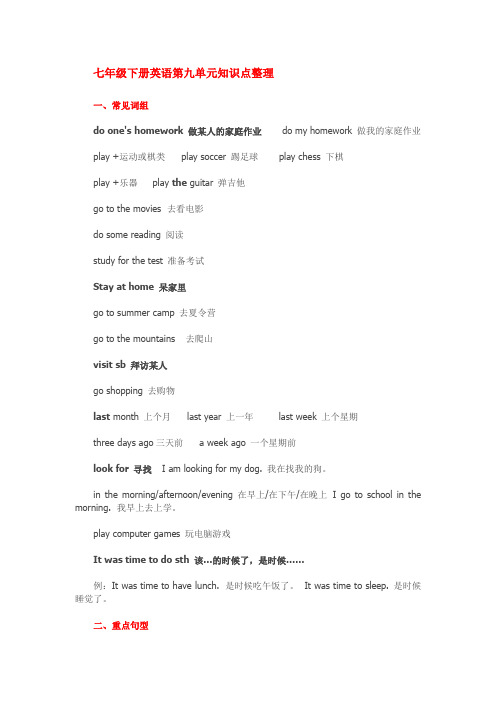
七年级下册英语第九单元知识点整理一、常见词组do one's homework 做某人的家庭作业 do my homework 做我的家庭作业play +运动或棋类 play soccer 踢足球 play chess 下棋play +乐器play the guitar 弹吉他go to the movies 去看电影do some reading 阅读study for the test 准备考试Stay at home 呆家里go to summer camp 去夏令营go to the mountains 去爬山visit sb 拜访某人go shopping 去购物last month 上个月 last year 上一年last week 上个星期three days ago三天前 a week ago 一个星期前look for 寻找 I am looking for my dog. 我在找我的狗。
in the morning/afternoon/evening 在早上/在下午/在晚上 I go to school in the morning. 我早上去上学。
play computer games 玩电脑游戏It was time to do sth 该…的时候了,是时候……例:It was time to have lunch. 是时候吃午饭了。
It was time to sleep. 是时候睡觉了。
二、重点句型(1)-How was your weekend? 你的周末过得怎么样?--It was great./OK 太好了。
/不错。
(2)-It was time to go home. 是时候回家了三:单元语法一般过去时态一般过去时态表示过去发生的动作或存在的状态,动词通常用一般过去式来表示,除动词be的过去式was/were有人称变化,其他都没人称的变化。
I was a doctor . 我过去是一个医生。
七年级英语Unit 9 How was your weekend知识精讲

初一英语Unit 9 How was your weekend?【本讲主要内容】Unit 9 How was your weekend?通过本课的学习我们应该能做下面的事:1. 学会动词的过去式。
2. 学会使用过去时。
3. 学会介词后接动名词的用法。
4. 学会过去时描写自己曾做过的事和他人曾做过的事。
【知识掌握】【知识点精析】一. 文化背景由于英语中有时态的要求,即不同的时态有不同的表达法,因此大家在学习时,注意积累,准确记忆。
这也是学好英语的基本要求。
二. 词汇用法本单元所涉及的短语及用法1. go 动词译为去, 动身go to sleep/go to bed 去睡觉go home 回家go to the movies去看电影go shopping去购物go for a walk 去散步go wrong 变坏,出毛病go over 复习,浏览go ahead 前面走,尽管去做go in for 从事于物做主语,表示运行Everything goes well. 一切顺利。
go 名词译为尝试Do you want a go? 你想尝试吗?be going to 打算,计划做某事用于一般将来时We are going to have a party at school next Sunday.have/has gone to 去某地了They have gone to New York. 他们去纽约了。
They have been to New York. 他们去过纽约。
have gone to 是指某人去某地,且人没回来。
也就是人不在本地。
have been to是某人去过某地了,且人已经回来了,也就是人目前在本地。
go on doing sth. 继续做某事After a break, he went on his speaking.停顿了一会,他继续他的讲话。
go on to do sth. 接着做(另一件事)He brushed his teeth, and went on to wash his face.他刷完牙,接着又洗脸。
七年级新目标英语下册Unit9 How was your weekend

规则动词过去式的变化情况: 1. look play hope plan start use watch love
2. live 3. stop
4. study
carry
worry
不规则动词过去式的变化情况:
is/am was see saw take took
are were give gave tell told
1 Last summer my family and I ________ (go)to the beach. 2. When it _________(rain), I stayed at rained home and watched TV. did get 3.What time _____you ______(get) to school this morning? were 4.They_______(be)always late for class last year.
What did he do …?
He studied for a test. test.
What did she do just now(刚才)? now(刚
She read a book. She She did some reading.
What did they do last summer? summer?
4.--What did Tony do last Sunday? A -- He _____ the movies. A. went to B. goes to C. went for D. going to A 5. – Is that ____ interesting book? -- Yes , but it is _____difficult. A. an ,a little B. an ,a few C. a ,little D. a ,bit
新目标七年级下unit9知识点
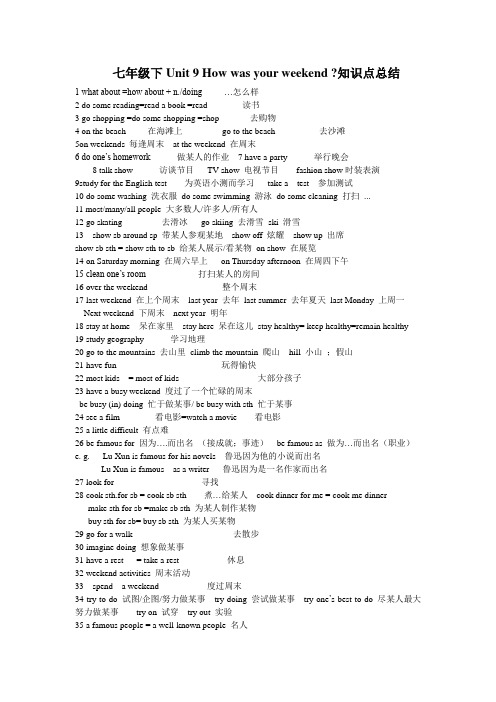
七年级下Unit 9 How was your weekend ?知识点总结1 what about =how about + n./doing …怎么样2 do some reading=read a book =read 读书3 go shopping =do some shopping =shop 去购物4 on the beach 在海滩上go to the beach 去沙滩5on weekends 每逢周末at the weekend 在周末6 do one’s homework 做某人的作业7 have a party 举行晚会8 talk show 访谈节目TV show 电视节目fashion show时装表演9study for the English test 为英语小测而学习take a test 参加测试10 do some washing 洗衣服do some swimming 游泳do some cleaning 打扫...11 most/many/all people 大多数人/许多人/所有人12 go skating 去滑冰go skiing 去滑雪ski 滑雪13 show sb around sp 带某人参观某地show off 炫耀show up 出席show sb sth = show sth to sb 给某人展示/看某物on show 在展览14 on Saturday morning 在周六早上on Thursday afternoon 在周四下午15 clean one’s room 打扫某人的房间16 over the weekend 整个周末17 last weekend 在上个周末last year 去年last summer 去年夏天last Monday 上周一Next weekend 下周末next year 明年18 stay at home 呆在家里stay here 呆在这儿stay healthy= keep healthy=remain healthy19 study geography 学习地理20 go to the mountains 去山里climb the mountain 爬山hill 小山;假山21 have fun 玩得愉快22 most kids = most of kids 大部分孩子23 have a busy weekend 度过了一个忙碌的周末be busy (in) doing 忙于做某事/ be busy with sth 忙于某事24 see a film 看电影=watch a movie 看电影25 a little difficult 有点难26 be famous for 因为….而出名(接成就;事迹)be famous as 做为…而出名(职业)e. g. Lu Xun is famous for his novels 鲁迅因为他的小说而出名Lu Xun is famous as a writer 鲁迅因为是一名作家而出名27 look for 寻找28 cook sth.for sb = cook sb sth 煮…给某人cook dinner for me = cook me dinnermake sth for sb =make sb sth 为某人制作某物buy sth for sb= buy sb sth 为某人买某物29 go for a walk 去散步30 imagine doing 想象做某事31 have a rest = take a rest 休息32 weekend activities 周末活动33 spend a weekend 度过周末34 try to do 试图/企图/努力做某事try doing 尝试做某事try one’s best to do 尽某人最大努力做某事try on 试穿try out 实验35 a famous people = a well-known people 名人36 check 检查37 key words 关键词the key to the door 门的钥匙38 sit down 坐下sit= be seated e. g. He sat there= He was seated there seat n 座位39 a suggestion (可数)= a piece of advice (可数)一则建议suggest doing 建议做某事advice sb to do = advice one’s doing 建议某人做某事40. a tiring job 累人的工作He is tired 他累了be tired of doing 厌倦做某事41.用and连接的单数主语,前面有each, every, many a, no,more than one等修饰时,谓语动词要用单数形式。
七年级英语下册第七单元Unit 9 How was your weekend-知识点整理
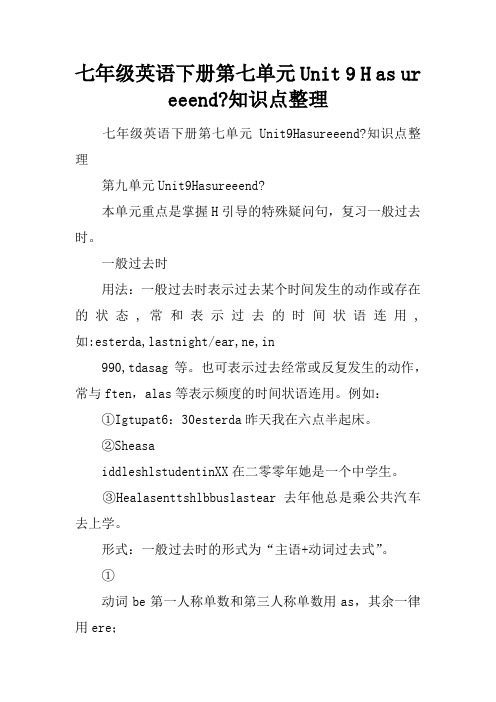
七年级英语下册第七单元Unit 9 H as ureeend?知识点整理七年级英语下册第七单元Unit9Hasureeend?知识点整理第九单元Unit9Hasureeend?本单元重点是掌握H引导的特殊疑问句,复习一般过去时。
一般过去时用法:一般过去时表示过去某个时间发生的动作或存在的状态,常和表示过去的时间状语连用,如:esterda,lastnight/ear,ne,in990,tdasag等。
也可表示过去经常或反复发生的动作,常与ften,alas等表示频度的时间状语连用。
例如:①Igtupat6:30esterda昨天我在六点半起床。
②SheasaiddleshlstudentinXX在二零零年她是一个中学生。
③Healasenttshlbbuslastear去年他总是乘公共汽车去上学。
形式:一般过去时的形式为“主语+动词过去式”。
①动词be第一人称单数和第三人称单数用as,其余一律用ere;②动词have/has一律用had,没有人称和数的变化;③行为动词一律用过去式,没有人称和数的变化;一般过去时的句型:肯定句句型:主语+动词过去式。
例如:①Iathedthefiltdasag两天前我看了这部电影。
②arasadterinXX在XX年玛丽是一名医生。
③Thestudentsplaedbasetballesterda昨天学生们打篮球了。
④Shebughtanteblastee上个星期她买了一个笔记本。
否定句句型:①主语+asn't/eren't+其他②主语+didn't+动词原形。
以上四句的否定句依次为:①Ididn'taththefiltdasag两天前我没有看这部电影。
②arasn'tadtrinXX在XX年玛丽不是一名医生。
③Thestudentsdidn'tplabasetballesterda昨天学生们没有打篮球了。
④Shedidn'tbuanteblastee上个星期她没买笔记本。
【知识学习】七年级英语下册第七单元Unit 9 How was your weekend-知识点整理
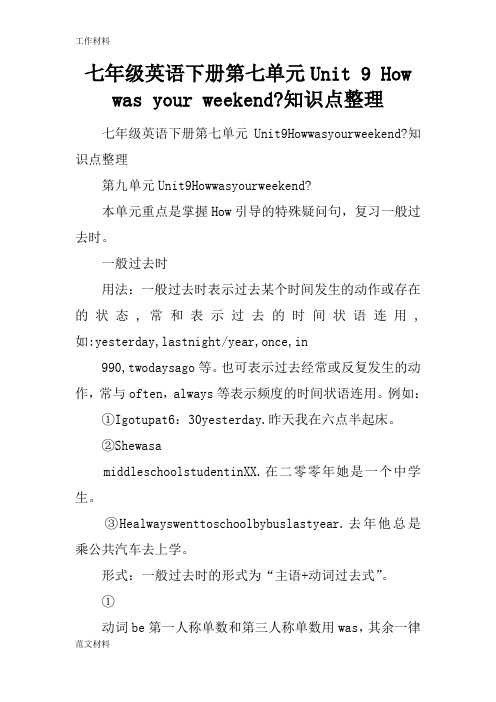
七年级英语下册第七单元Unit 9 How was your weekend?知识点整理七年级英语下册第七单元Unit9Howwasyourweekend?知识点整理第九单元Unit9Howwasyourweekend?本单元重点是掌握How引导的特殊疑问句,复习一般过去时。
一般过去时用法:一般过去时表示过去某个时间发生的动作或存在的状态,常和表示过去的时间状语连用,如:yesterday,lastnight/year,once,in990,twodaysago等。
也可表示过去经常或反复发生的动作,常与often,always等表示频度的时间状语连用。
例如:①Igotupat6:30yesterday.昨天我在六点半起床。
②ShewasamiddleschoolstudentinXX.在二零零年她是一个中学生。
③Healwayswenttoschoolbybuslastyear.去年他总是乘公共汽车去上学。
形式:一般过去时的形式为“主语+动词过去式”。
①动词be第一人称单数和第三人称单数用was,其余一律用were;②动词have/has一律用had,没有人称和数的变化;③行为动词一律用过去式,没有人称和数的变化;一般过去时的句型:肯定句句型:主语+动词过去式。
例如:①Iwatchedthefilmtwodaysago.两天前我看了这部电影。
②marywasadocterinXX.在XX年玛丽是一名医生。
③Thestudentsplayedbasketballyesterday.昨天学生们打篮球了。
④Sheboughtanotebooklastweek.上个星期她买了一个笔记本。
否定句句型:①主语+wasn't/weren't+其他②主语+didn't+动词原形。
以上四句的否定句依次为:①Ididn'twatchthefilmtwodaysago.两天前我没有看这部电影。
人教新目标七年级英语下册Unit 9精讲

Unit 9 How was your weekend?你的周末过得怎样?Practice makes perfect.熟成生巧。
一.短语1. play +运动 play soccer / tennis / basketball / volleyball /baseball play sports / ping-pong (=table tennis) / chess/ cardsplay the + 乐器 play the guitar / violin / piano / trumpet / drumsplay with…和某人/ 物玩耍2.have +三餐 have breakfast /lunch /dinner (= supper)3.go to the beach go to the movies go for a walk go to the mountains 4.go shopping\do some shopping \go to the shop 买东西5.last weekend / over the weekend 上周末 on weekends 每周末6.on +某日+morning \afternoon \eveningeg: on Sunday morning, on a cold morning, on May 1, 1999in the+ morning\afternoon\eveningin+年/月/季节 eg: in 1999 in January ,1999 in winterat +时刻eg: at 6:00 o'clock, at half past six(=at six thirty)at a quarter past seven=at seven fifteenat a quarter to seven=at six forty-five7. last month /year /week 上个月/去年/上个周next month / year / week 下个月/明年/下个周8.What about+n /v-ing /prep=How about …? (……怎么样呢?)<用于反问别人或提建议> eg: What about playing soccer?9. spend the weekend last week 度过上周的周末spend… on sth spend… (in) doing sthI spent twenty dollars on this T-shirt last week.=I spent twenty dollars (in) buying this T-shirt last week.10.It’s time to do sth.=It’s time for sth. (是该….的时候了)It’s time for school.= It’s time to go to school11.help sb. with sth/doing sth.. (在……方面帮助某人)12.help sb. (to) do sth. (帮助某人做某事)13.do some +动词“ing” (做点……) eg: do some reading14.stay at home (呆在家) live in Toronto, Canada 住在加拿大多伦多15.have a party (开晚会) study geography 学习地理16.visit (a person) (拜访……), visit (a place) 参观……17.talk show (访谈节目) a little difficult 一点难18.study for the <math> test (准备…<数学>测验)19.practice sth. / doing sth. (练习…/做某事) eg: practice Englsih, practice speaking English20. middle school (中学) eg: at No. 3 Middle School 在三中21.cook…for sb.(为某人做…饭) She's a good cook. 她是一个好厨师。
【初中英语七年级下】【unit 9】【How was your weekend】
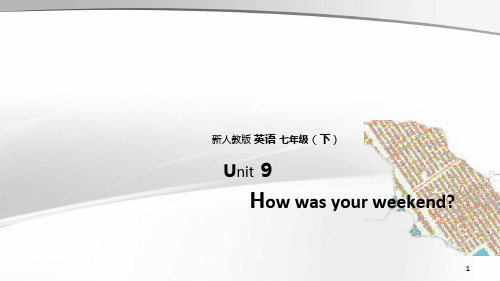
辨析:learn与study
①learn和study都可以表示“学,学习”,有时可以互换。 When did you begin to learn / study English? 你什么时候开始学习英语的?
②learn侧重于学习的结果,因此常译作“学会;学到”;study侧重学习的过程。 He studied hard and last learned the language. 他努力学习,最终学会了这门语言。
8
mountain:n. 山,山脉 geography:n. 地理学 spend:v. 度过,花费 yesterday:n. 昨天 No.:abbr.(=number)编号,
号
middle:adj. 中间的,中等的 middle school:中学
most:adj. 大多数的,大部分的,
几乎全部的
go shopping:购物
had:v. have的过去式
saw:v. see的过去式 talk:n. 访谈节目,谈话,交谈,
Vocabulary
演讲
talk show:访谈节目
wrote:v. write的过去式
9
song:n. 歌,歌曲 go for a walk:去散步 sit:v. 坐,使坐下 sat:v. sit的过去式 down:adv. 向下,在下面,下
③learn多用于初级阶段的学习或带有模仿性的操作技艺等;study则用于较高深或周密的“研究”。 He learns English over the radio. 他通过收音机来学英语。 The baby is learning to speak. 这个婴儿正在学说话。 He is studying the math problem. 他正在研究那道数学题。
新目标七级下册英语知识点总结:UnitHowwasyourweekend
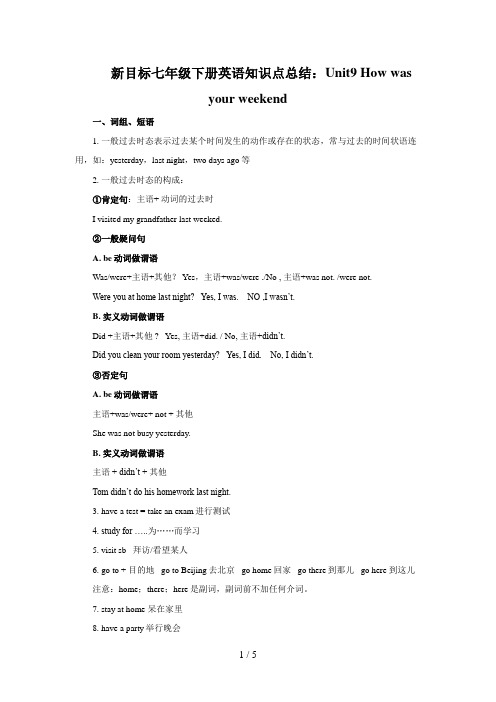
新目标七年级下册英语知识点总结:Unit9 How wasyour weekend一、词组、短语1. 一般过去时态表示过去某个时间发生的动作或存在的状态,常与过去的时间状语连用,如:yesterday,last night,two days ago等2. 一般过去时态的构成:①肯定句:主语+ 动词的过去时I visited my grandfather last weeked.②一般疑问句A. be动词做谓语Was/were+主语+其他? Yes,主语+was/were ./No , 主语+was not. /were not.Were you at home last night? Yes, I was. NO ,I wasn’t.B. 实义动词做谓语Did +主语+其他 ? Yes, 主语+did. / No, 主语+didn’t.Did you clean your room yesterday? Yes, I did. No, I didn’t.③否定句A. be动词做谓语主语+was/were+ not + 其他She was not busy yesterday.B. 实义动词做谓语主语+ didn’t + 其他Tom didn’t do his homework last night.3. have a test = take an exam进行测试4. study for …..为……而学习5. visit sb 拜访/看望某人6. go to + 目的地 go to Beijing去北京 go home回家 go there到那儿 go here 到这儿注意:home;there;here是副词,副词前不加任何介词。
7. stay at home 呆在家里8. have a party举行晚会9. do some reading 读书do some cooking做饭do some washing 洗衣do some cleaning 打扫卫生do some listening练习听力12. How about = What about ……怎么样?What about + v-ing ?做某事怎么样? What about going shopping?去购物怎么样?What about +sth ? 某物怎么样? What about the watch?这块手表怎么样?What about +sb? 某人怎么样?/某人的观点意见怎么样?What about your mother?你妈妈怎么样?My mother likes the scarf , what about your mother?我妈妈喜欢喜欢这个围巾,你妈妈呢?13. spend ----spent 度过,花费sb spend some time (in ) doing sth 某人花一段时间做某事sb spend some time on sth 某人花一段时间在某事上I spent 2 hours in doing my homework.我花了2 个小时做我的家庭作业。
新目标七年级下册英语教案及知识点Unit 9教案3
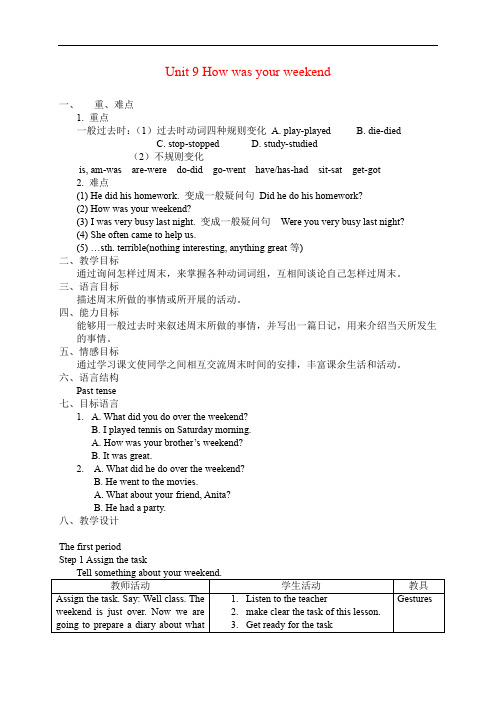
Unit 9 How was your weekend一、重、难点1. 重点一般过去时:(1)过去时动词四种规则变化 A. play-played B. die-diedC. stop-stoppedD. study-studied(2)不规则变化is, am-was are-were do-did go-went have/has-had sit-sat get-got2. 难点(1) He did his homework. 变成一般疑问句Did he do his homework?(2) How was your weekend?(3) I was very busy last night. 变成一般疑问句Were you very busy last night?(4) She often came to help us.(5) …sth. terrible(nothing interesting, anything great等)二、教学目标通过询问怎样过周末,来掌握各种动词词组,互相间谈论自己怎样过周末。
三、语言目标描述周末所做的事情或所开展的活动。
四、能力目标能够用一般过去时来叙述周末所做的事情,并写出一篇日记,用来介绍当天所发生的事情。
五、情感目标通过学习课文使同学之间相互交流周末时间的安排,丰富课余生活和活动。
六、语言结构Past tense七、目标语言1. A. What did you do over the weekend?B. I played tennis on Saturday morning.A. How was your brother’s weekend?B. It was great.2. A. What did he do over the weekend?B. He went to the movies.A. What about your friend, Anita?B. He had a party.八、教学设计The first periodStep 1 Assign the taskThe second periodStep 1 2a&2b从听力角度开展语言的输入,在完成听力任务的基础上,为学生在接下来完成任务的过程中,落实Step 3 Post-taskThe third periodThe fourth period日记。
新目标七下Unit 9 How was your weekend重点知识归纳
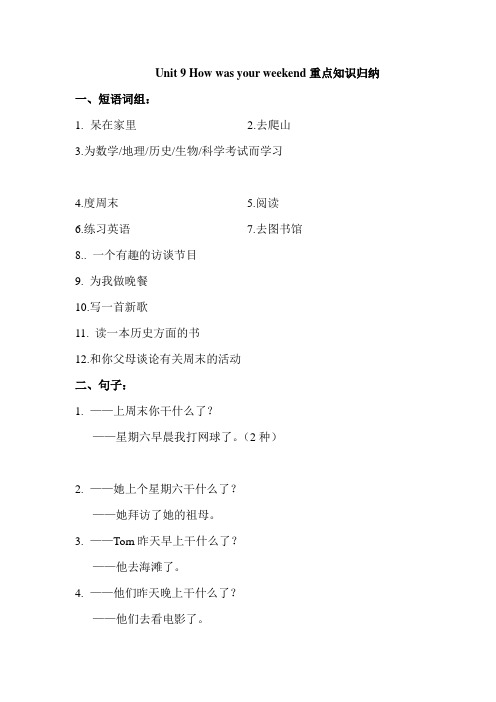
Unit 9 How was your weekend重点知识归纳一、短语词组:1.呆在家里2.去爬山3.为数学/地理/历史/生物/科学考试而学习4.度周末5.阅读6.练习英语7.去图书馆8.. 一个有趣的访谈节目9. 为我做晚餐10.写一首新歌11. 读一本历史方面的书12.和你父母谈论有关周末的活动二、句子:1.——上周末你干什么了?——星期六早晨我打网球了。
(2种)2.——她上个星期六干什么了?——她拜访了她的祖母。
3.——Tom昨天早上干什么了?——他去海滩了。
4.——他们昨天晚上干什么了?——他们去看电影了。
5.——周末过得怎么样,托尼?——太棒了/还可以.6. ——萨拉的假期过得怎么样?——不太好。
她打扫房间了而且还为语文考试学习。
7. 他坐下来看小狗汪汪和一只友好的黑猫玩8. 他没狗也没家了。
三、用所给单词的适当形式填空。
1. I often practice __________ (speak) English with my father.2. When it (rain), I stayed at home and watched TV.3. We (be) in Dalian last year.4. It’s time for the students ________ (read) English.5. What day (be) it yesterday?6. I often help parents _____ (do) some housework.IV写出下列单词的过去式1.do 7.see 13.look2.read 8.go 14.cook3.write 9.is 15.ask4.play 10.are 16practice5.study 11. watch 17.have6.spend 12.sit 18.clean。
新目标七年级英语下册Unit 9
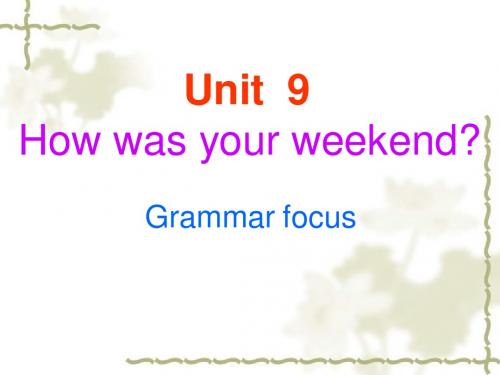
drew a picture
drank a water
按要求写单词. 1.relax(三单) 2.go(过去式) 3.do(过去式) 4.thief(复数) 5.she(形物) 6.story(复数) 7.study(过去式) 8.have(过去式) 9.visit(过去式) 10.tomato(复数) 11.friend(形容词) 12.leaf(复数)
alidays/vacation, what did he/she do?
Names
Carol
Activities he/she wanted
Activities she/he did
How was his/her weekend?/feeling
boring/terrible/ awful
What did Tom do last week?
Last Monday
Last Tuesday
Last Wednesday
Last Friday
What did you do over the weekend/last weekend?
Saturday
morning
Sunday
morning
was Two years ago, he ____ in the school. cleaned the classroom He ___________.
Yesterday he was/stayed at home __________ watched and ________ TV.
were One day they _____ in the disco and danced ______.
新目标七年级下册英语知识点总结范文Unit9Howwasyourweekend

新目标七年级下册英语知识点总结范文Unit9Howwasyourweekend一、词组、短语1.一般过去时态表示过去某个时间发生的动作或存在的状态,常与过去的时间状语连用,如:yeterday,latnight,twodayago等2.一般过去时态的构成:①肯定句:主语+动词的过去时Iviitedmygrandfatherlatweeked.②一般疑问句A.be动词做谓语Wa/were+主语+其他?Ye,主语+wa/were./No,主语+wanot./werenot.WereyouathomelatnightYe,Iwa.NO,Iwan’t.B.实义动词做谓语Did+主语+其他Ye,主语+did./No,主语+didn’t.DidyoucleanyourroomyeterdayYe,Idid.No,Ididn’t.③否定句A.be动词做谓语主语+wa/were+not+其他Shewanotbuyyeterday.B.实义动词做谓语主语+didn’t+其他Tomdid n’tdohihomeworklatnight.3.haveatet=takeane某am进行测试4.tudyfor…..为……而学习5.viitb拜访/看望某人6.goto+目的地gotoBeijing去北京gohome回家gothere到那儿到这儿注意:home;there;here是副词,副词前不加任何介词。
7.tayathome呆在家里gohere8.haveaparty举行晚会9.doomereading读书doomecooking做饭doomewahing洗衣doomecleaning打扫卫生doomelitening练习听力12.Howabout=Whatabout……怎么样?Whatabout+v-ing做某事怎么样?Whataboutgoinghopping去购物怎么样?Whatabout+th某物怎么样?Whataboutthewatch这块手表怎么样?Whatabout+b某人怎么样?/某人的观点意见怎么样?Whataboutyourmother你妈妈怎么样?Mymotherlikethecarf,whataboutyourmother我妈妈喜欢喜欢这个围巾,你妈妈呢?13.pend----pent度过,花费Ipent2hourindoingmyhomework.我花了2个小时做我的家庭作业。
七年级英语下册unit9单元知识讲解
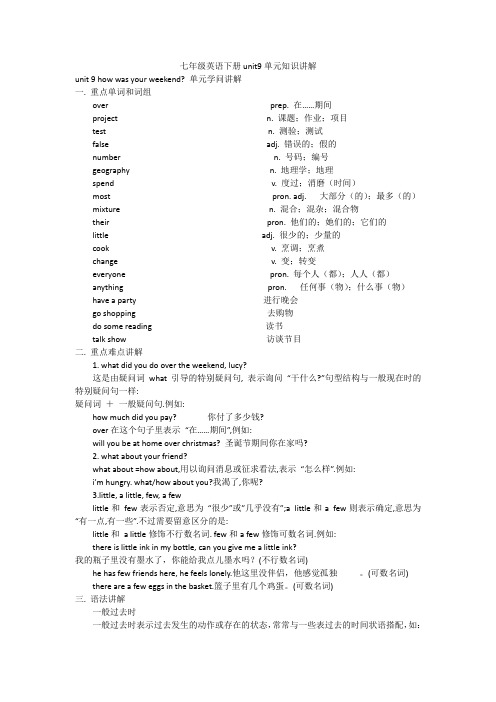
七年级英语下册unit9单元知识讲解unit 9 how was your weekend? 单元学问讲解一. 重点单词和词组over prep. 在……期间project n. 课题;作业;项目test n. 测验;测试false adj. 错误的;假的number n. 号码;编号geography n. 地理学;地理spend v. 度过;消磨(时间)most pron. adj.大部分(的);最多(的)mixture n. 混合;混杂;混合物their pron. 他们的;她们的;它们的little adj. 很少的;少量的cook v. 烹调;烹煮change v. 变;转变everyone pron. 每个人(都);人人(都)anything pron. 任何事(物);什么事(物)have a party进行晚会go shopping 去购物do some reading 读书talk show 访谈节目二. 重点难点讲解1. what did you do over the weekend, lucy?这是由疑问词what引导的特别疑问句, 表示询问“干什么?”句型结构与一般现在时的特别疑问句一样:疑问词+一般疑问句.例如:how much did you pay?你付了多少钱?over在这个句子里表示“在……期间”,例如:will you be at home over christmas? 圣诞节期间你在家吗?2. what about your friend?what about =how about,用以询问消息或征求看法,表示“怎么样”.例如:i’m hungry. what/how about you?我渴了,你呢?3.little, a little, few, a fewlittle和few表示否定,意思为“很少”或”几乎没有”;a little和a few则表示确定,意思为“有一点,有一些”.不过需要留意区分的是:little和a little修饰不行数名词. few和a few修饰可数名词.例如:there is little ink in my bottle, can you give me a little ink?我的瓶子里没有墨水了,你能给我点儿墨水吗?(不行数名词)he has few friends here, he feels lonely.他这里没伴侣,他感觉孤独。
七年级英语下册复习笔记《Unit 9 How was your weekend》

Unit 9 How was your weekend?一,一般过去时定义:表示在过去的时间里发生的动作或状态。
肯定式:谓语动词用过去式 Eg: My weekend was great.疑问式:连系动词be的疑问句,把句中的was、were提到句首实义动词的疑问句在句首加助动词did,后用动词原形。
否定式:连系动词be的否定句,在was、were后加not实义动词的否定句在实义动词前加didn't,谓语动词用动词原形。
动词过去式构成:一般的在动词词尾后加ed以e结尾的动词在e后加d重读闭音节并且末尾只有一个辅音字母的,双写该辅音字母再加ed以辅音字母加y结尾的词,变y为i加ed不规则的特殊记:用法:一般过去时表示过去某一确定时间内发生的动作或存在的状态,经常与表示过去的时间状语连用。
1. last week \month \year2. yesterday3. t he daybefore yesterday4. 时间段+ago5. in+年6. just now7. this morning二, spend 、pay、 take 、cost区别Spend:其主语必须是人。
Spend time\money on sth Spend ……(in) doing sthPay: 其主语必须是人。
不能表示花费时间。
Pay……for……Take :其主语必须是物。
(it)It takes sb some time to do sthCost:表示花费钱,主语是物。
三. A few ,few的区别A few 修可数名词,表肯定。
“有一些”Few: 修可数名词,表否定“几乎没有”重点词组have a party stay at home play tennis do some reading clean one's room go to the cinema go shopping talk show go to the beach practice doing sth study for the test do one's homework go for a walk have a good trip have a bath=take a shower spend……(in)sth spend on sth enjoy doing sth watch sb do sth watch sb doing sth It's time to do sthIt takes sb some time to do sth花费某人多长时间去做某事。
- 1、下载文档前请自行甄别文档内容的完整性,平台不提供额外的编辑、内容补充、找答案等附加服务。
- 2、"仅部分预览"的文档,不可在线预览部分如存在完整性等问题,可反馈申请退款(可完整预览的文档不适用该条件!)。
- 3、如文档侵犯您的权益,请联系客服反馈,我们会尽快为您处理(人工客服工作时间:9:00-18:30)。
新目标七年级下册英语知识点总结:Unit9 How wasyour weekend一、词组、短语1. 一般过去时态表示过去某个时间发生的动作或存在的状态,常与过去的时间状语连用,如:yesterday,last night,two days ago等2. 一般过去时态的构成:①肯定句:主语+ 动词的过去时I visited my grandfather last weeked.②一般疑问句A. be动词做谓语Was/were+主语+其他?Yes,主语+was/were ./No , 主语+was not. /were not.Were you at home last night? Yes, I was. NO ,I wasn’t.B. 实义动词做谓语Did +主语+其他? Yes, 主语+did. / No, 主语+didn’t.Did you clean your room yesterday? Yes, I did. No, I didn’t.③否定句A. be动词做谓语主语+was/were+ not + 其他She was not busy yesterday.B. 实义动词做谓语主语+ didn’t + 其他Tom didn’t do his homework last night.3. have a test = take an exam进行测试4. study for …..为……而学习5. visit sb 拜访/看望某人6. go to + 目的地go to Beijing去北京go home回家go there到那儿go here 到这儿注意:home;there;here是副词,副词前不加任何介词。
7. stay at home 呆在家里8. have a party举行晚会9. do some reading 读书do some cooking做饭do some washing 洗衣do some cleaning 打扫卫生do some listening练习听力12. How about = What about ……怎么样?What about + v-ing ? 做某事怎么样?What about going shopping? 去购物怎么样?What about +sth ? 某物怎么样?What about the watch? 这块手表怎么样?What about +sb? 某人怎么样?/某人的观点意见怎么样?What about your mother? 你妈妈怎么样?My mother likes the scarf , what about your mother?我妈妈喜欢喜欢这个围巾,你妈妈呢?13. spend ----spent 度过,花费sb spend some time (in )doing sth 某人花一段时间做某事sb spend some time on sth 某人花一段时间在某事上I spent 2 hours in doing my homework.我花了2 个小时做我的家庭作业。
I spent 2 hours on my homework.我花了2 小时在我的家庭作业上。
sb spend some money (on )doing sth某人花钱买某物Sb spend some money on sth.某人花钱在某物上I spent 10yuan on buying this dictionary. 我花了10元钱买这本词典。
I spent 10yuan on this dictionary . 我花了10元钱在这本词典上。
14. in the middle of 在……的中间15. see sb doing sth 看见某人正做某事16.talk show 谈话节目,脱口秀17. for most kids 对大多数孩子来说18. cook ……for = cook sb sth 为某人做……My aunt cooked dinner for me . = My aunt cooked me dinner.注意:当morning,afternoon,evening,night这些名词被一个定语修饰时,前面的介词用on,而不用in ,on指具体的一天,in指不具体的某一日。
On a cold night 在一个寒冷的夜晚on Sunday evening在星期天的晚上另外,morning,afternoon,evening,night这些名词前有this,that,next,tomorrow,yesterday这些限定词修饰时,前面一律不用介词。
This morning 今天早晨yesterday night 昨天晚上二、句型(1)I visited my aunt last weekend.(2)-- How was your weekend?--It was great./OK(3)—It was time to go home.三、重点句子1. What did you do last weekend? On Sunday morning, I watched TV.2. I studied for the science test.3. What /How about your friend ,Carol? She practiced English.4. How was your weekend? It’s was great. / Good. / It wasn’t good. /It was not bad.5. How was your mom’s weekend?6. You went to the mountains.7. Yesterday, we asked ten students at No.3 middle school what they did last weekend.8. For most students, the weekend was fun.9. I had a busy weekend.10. My aunt cooked dinner for me.11. I read a book about history.12. Do you think everyone enjoys their weekends?13. He sat down and watched the dog play with a friendly black cat.14. He looked for hid dog, but it wasn’t there.15. It was time to go home.16. He doesn’t want to do anything.四、日常交际用语(1)—What did you do last weekend?--On Saturday morning,I played teenis.(2)—How was your weekend?--It was great.I went to the brach.一般过去时态一般过去时态表示过去发生的动作或存在的状态,动词通常用一般过去式来表示,除动词be的过去式was/were有人称变化,其他都没人称的变化.过去式的构成(1)一般情况下在动词词尾加-ed.如:stay—stayed help—helped visit-visited(2)词尾是e的动词加-d.如:like—liked live—lived(3)以一个元音字母加一个辅音结尾的重读闭章节应双写该辅音字母,再加-ed.如: stop—stopped plan—planned(4)以辅音字母+y结尾的动词,要将y改为i再加-ed.如: study—studied worry—worried (5)不规则动词的过去am/is—was are—were have-hadgo—went find—found do—did see-saw五、重点句型和语法1.一般过去时表示过去发生的动作或存在的状态,通常与过去的时间状语连用:yesterday ,last week (month,year)(1)系动词be的过去时:am(is)→was, are →were陈述句:He was at home yesterday.否定句:He wasn’t at home yesterday.疑问句:Was he at home yesterday?Yes ,he was./No ,he wasn’t.(2)行为动词的一般过去时:陈述句:主语+动词过去式+其它I go to the movie. →I went to the movie.否定句:主语+助动词didn’t+动词原形+其它I don’t go to school today. →I didn’t go to school.一般疑问句:Did +主语+动词原形+其它Do you have breakfast? →Did you have breakfast?Yes,I do./No,I don’t.Yes,I did./No,I didn’t.(3)规则动词的过去式变化规则变化规则例词:一般在词尾加—ed. play→played以不发音的e结尾的,只加--d. like →likedlove →loved以辅音字母+y 结尾的,变y为i ,再加—ed. study →studied carry →carried以一个辅音字母结尾的重读闭音节,先双写这个辅音字母,再加-ed stop →stopped plan →planned动词不规则变化:do →did have →had go →wentsee →saw read →read get →gogive →gave sleep →slept eat →atewrite →wrote find_---found2. what’s the date today? It’s …3. What was the date yesterday? It was…4. What’s the weather like today? It’s …?5. How was your weekend?6.What did she do ? She did her homework7.What did he do last weekend ? He played soccer8.It’s time to go home= It’s time for home。
